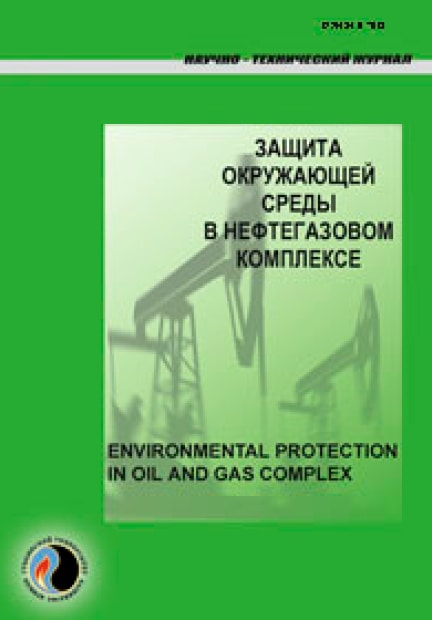Scientific and technical journal
«Environmental protection in oil and gas complex»
ISSN 2411-7013

Results of full-scale long-term studies of the impact of recycled drilling wastewater on soil, growth and development of crops. P. 1
UDC: 502.62+502.6:622.276.5
DOI: 10.33285/2411-7013-2023-1(310)-42-49
Authors:
1 Scientific Research Institute Federal Research Centre for Projects Evaluation and Consulting Services, Moscow, Russia
Keywords: drilling wastewater, wastewater disposal, legal basis for the use of wastewater for irrigation, field studies, removal of heavy metals by plants
Annotation:
The reuse of wastewater for technical purposes in the process of drilling oil and gas wells only partially reduces the volume of water consumption. One of the most promising options for solving the problem of dehydration of the contents of earthen drilling waste reservoirs is the disposal of drilling wastewater by using it for irrigation. The experience of using wastewater for irrigation of agricultural crops is given as a promising direction for their disposal in foreign countries and the Russian Federation. It is shown that three tasks are solved during irrigation with wastewater: removal and purification of polluted waters containing organic substances and biogenic elements; their use in the fields for artificial soil moistening; the introduction of a large amount of mineral, organic and bacterial fertilizers into the soil. The legal basis for the use of wastewater for irrigation in the Russian Federation is analyzed. Attention is drawn to the inconsistencies in the legislative acts and regulations on the topic under consideration, which are mainly aimed not at the flexible use of wastewater for irrigation, which makes it possible to reduce their discharge into water bodies, increase the yield of grown fodder crops, but on prohibitive measures for the disposal of wastewater. The results of full-scale long-term studies of the impact of recycled drilling wastewater on the soil, growth and development of crops are presented.
Bibliography:
1. Bezrodnyy Yu.G. Sovremennye problemy obrashcheniya s otkhodami bureniya skvazhin na sushe // Proektirovanie i razrabotka neftegazovykh mestorozhdeniy. – 2020. – № 1. – S. 34–43.2. Myurrey R. Tsel' – Zero Waste: per. s angl. – M.: OMNNO "Sovet Grinpis", 2004. – 232 s.
3. Bulatov A.I., Makarenko P.P., Shemetov V.Yu. Okhrana okruzhayushchey sredy v neftegazovoy promyshlennosti. – M.: Nedra, 1997. – 483 s.
4. Bezrodnyy Yu.G. Snizhenie ob"emov otkhodov bureniya neftyanykh i gazovykh skvazhin na sushe // Stroitel'stvo neftyanykh i gazovykh skvazhin na sushe i na more. – 2020. – № 12(336). – S. 14–19. – DOI: 10.33285/0130-3872-2020-12(336)-14-19
5. GOST R 53241-2008. Geologorazvedka morskaya. Trebovaniya k okhrane morskoy sredy pri razvedke i osvoenii neftegazovykh mestorozhdeniy kontinental'nogo shel'fa, territorial'nogo morya i pribrezhnoy zony. – Vved. 2010–01–01. – M.: Standartinform, 2009. – III, 15 s.
6. Bezrodnyy Yu.G. Razrabotka metodov obespecheniya okhrany okruzhayushchey sredy pri proektirovanii i stroitel'stve neftegazovykh skvazhin: avtoref. dis. … d-ra tekhn. nauk: 25.00.15. – M., 2009. – 44 s.
7. Bezrodnyy Yu.G. Kontseptsiya malootkhodnoy tekhnologii stroitel'stva skvazhin i ee prakticheskaya realizatsiya na Severnom Kavkaze i v Nizhnem Povolzh'e // Neftegazovye tekhnologii. – 2000. – № 4. – S. 7–10.
8. Bezrodny Yu.G. Minimization of adverse effects of prospecting holes construction on specially protected territories of nature // Oil industry. – 2003. – № 3. – P. 60–63.
9. Shemetov V.Yu., Levshin V.A., Brid'ko Yu.I. Ispol'zovanie burovykh stochnykh vod v irrigatsii // Neft. khoz-vo. – 1990. – № 5. – S. 65–68.
10. Ispol'zovanie otrabotannykh burovykh rastvorov dlya melioratsii pochv / V.Yu. Shemetov, V.I. Ryabchenko, M.Yu. Ezhov [i dr.] // Bor'ba s korroziey i zashchita okruzhayushchey sredy. Otechestv. opyt: ekspress-inform. – 1988. – № 5. – S. 12–14.
11. Khvesik M.A. Trebovaniya monitoringa pri oroshenii stochnymi vodami // Melioratsiya i vodnoe khoz-vo. – 1990. – № 11. – S. 51–52.
12. Mara D., Kernkross S. Rukovodstvo po bezopasnomu ispol'zovaniyu stochnykh vod i ekskrementov v sel'skom khozyaystve i akvakul'ture: mery po okhrane zdorov'ya lyudey. – Zheneva: VOZ, 1992. – 213 s.
13. Kremenskoy V.I., Verdysh M.V. Stochnye vody kak perspektivnyy resurs povysheniya vodoobespechennosti Respubliki Krym // Prirodoobustroystvo. – 2016. – № 5. – S. 72–77.
14. Formirovanie diversifitsirovannogo podkhoda v chasti trebovaniy k kachestvu ochistki stochnykh vod: rekomendatsii Soveta Federatsii Federal'nogo sobraniya Rossiyskoy Federatsii. – 2018. – URL: http://council.gov.ru/activity/activities/roundtables/92962/ (data obrashcheniya 13.11.2022).
15. Ratnikov A.A. Ispol'zovanie bytovykh stochnykh vod dlya orosheniya zelenykh nasazhdeniy // Mir klimata. – 2014. – № 86. – S. 120–128.
16. Stochnye vody – neosvoennyy resurs: vsemirnyy doklad Organizatsii Ob"edinennykh Natsiy o sostoyanii vodnykh resursov za 2017 g. Rabochee rezyume. – Perudzha, Italiya, 2017. – 12 s.
17. Problema sbrosa stochnykh vod na rel'ef mestnosti. – URL: https://flotators.ru/news/problema-sbrosa-stochnakh-vod-na-relef-mestnosti/ (data obrashcheniya 13.11.2022).
18. Sbros stochnykh vod na rel'ef zapreshchen: zakony FZ-7 i MPR № 238. 07.10.2016. –URL: https://ecopromcentr.ru/blog/sbros-vod-na-relief/ (data obrashcheniya 13.11.2022).
19. Budanov M.F. Sistema i sostav kontrolya za kachestvom prirodnykh i stochnykh vod pri ispol'zovanii ikh dlya orosheniya. – Kiev: Urozhay, 1970. – 48 s.